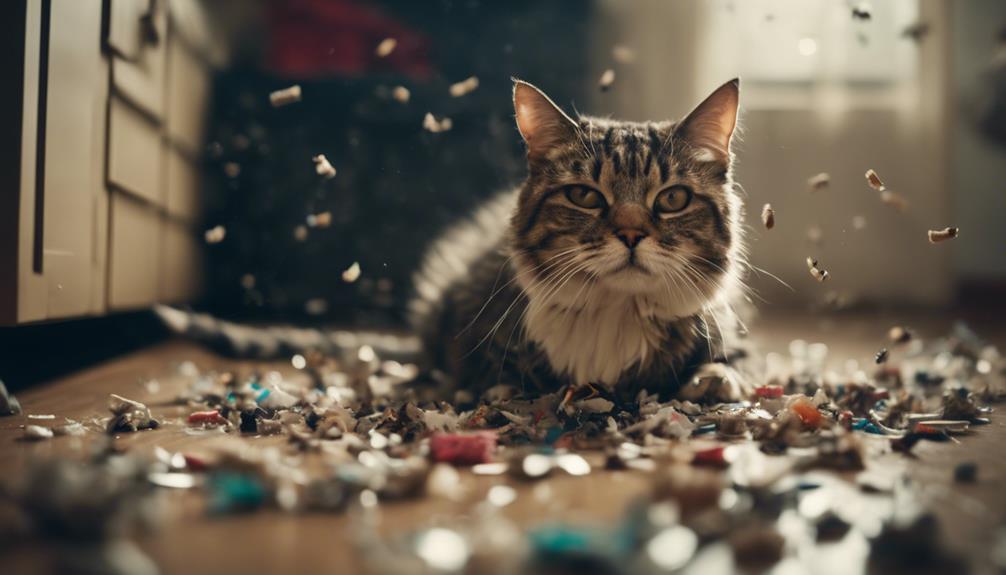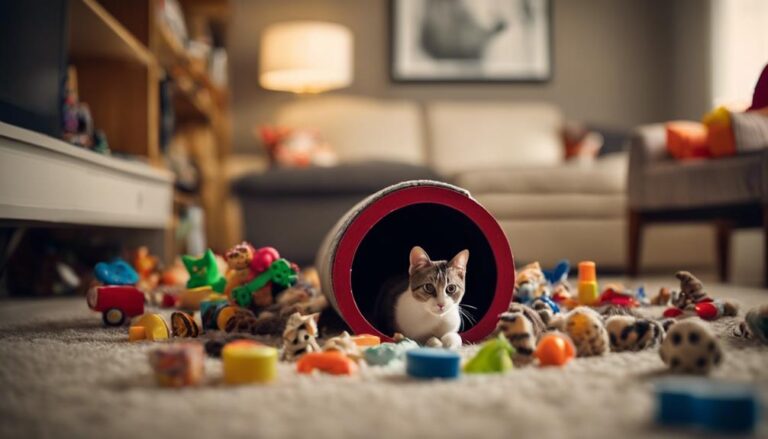Maintaining a clean litter box is crucial for the well-being of your feline companion and your own health. The risks associated with a dirty litter box go beyond just unpleasant odors and unsightly mess. By neglecting this essential chore, you might be exposing yourself and your cat to a range of health hazards that can have lasting effects. From respiratory issues to the spread of diseases, the consequences of a dirty litter box are far-reaching. Understanding these risks is vital in ensuring a safe and healthy environment for both you and your furry friend.
Health Risks for Cats
Regularly cleaning your cat's litter box is essential to prevent health risks such as kidney, bladder, and urinary tract diseases. A dirty litter box can harbor bacteria from feces, leading to urinary tract infections in cats. What makes this particularly concerning is that cats can suffer silently from UTIs, as they may show no symptoms.
Due to their sensitivity to cleanliness, cats may even refuse to use a dirty litter box, exacerbating the risk of developing bladder diseases. This highlights the importance of maintaining a clean litter box environment to safeguard your feline companion's well-being. By ensuring regular cleaning of the litter box, you can significantly reduce the chances of your cat facing these health issues.
Health Risks for Humans
Dirty litter boxes pose significant health risks to humans, including the potential transmission of diseases such as cat-scratch disease and Salmonella infection. Here is how a dirty litter box can impact your health:
- Cat-scratch disease: Contracted from scratches or bites from infected cats, this disease can lead to fever, fatigue, and swollen lymph nodes, affecting around 10,000 people annually.
- Salmonella infection: Caused by bacteria in cat feces, this infection results in symptoms like diarrhea, fever, and abdominal cramps, impacting about 200,000 individuals in the U.S. each year.
- Respiratory issues: Inhaling ammonia from cat urine due to a dirty litter box can trigger respiratory problems, particularly risky for children and those with weakened immune systems.
- Roundworms: Found in cat feces, roundworms can lead to gastrointestinal issues like diarrhea and weight loss, posing a threat to human health.
Regularly cleaning your cat's litter box is crucial to prevent these health risks and safeguard your well-being.
Ammonia Exposure Concerns
Exposure to ammonia from cat urine poses serious health concerns, particularly for individuals at higher risk such as children and those with weakened immune systems. Cat urine contains ammonia, which can lead to respiratory irritation and various health issues when inhaled.
Overexposure to ammonia, especially in poorly ventilated areas with a dirty litter box, can result in symptoms like coughing, bronchitis, and potential lung problems. Children and immunocompromised individuals are particularly vulnerable to these respiratory issues from inhaling ammonia fumes.
Prolonged exposure to high levels of ammonia in cat urine may even cause respiratory illnesses in susceptible individuals. The strong odor of cat urine serves as a warning sign of the presence of ammonia, indicating the urgent need for proper ventilation and regular cleaning to minimize the risks associated with ammonia exposure.
Take proactive steps to ensure a clean litter box environment to safeguard against the potential health hazards linked to ammonia inhalation.
Dangers of Bacterial Infections
You must be aware of the dangers of bacterial infections that can originate from a dirty litter box. These infections, such as Cat Scratch Disease and Salmonella, can lead to serious health issues.
Take precautions to prevent the spread of bacteria by keeping the litter box clean and practicing good hygiene.
Bacterial Risks Explained
Exposure to a dirty litter box can lead to various bacterial infections, including Cat Scratch Disease, Toxoplasmosis, Salmonella, and fungal infections. Here's why these risks are critical:
- Cat Scratch Disease can cause fever, swollen lymph nodes, and rash, impacting your overall health.
- Toxoplasmosis, often found in cat waste, can result in flu-like symptoms and muscle aches, posing a threat, especially to pregnant individuals.
- Salmonella and other bacteria from dirty litter boxes can lead to severe health issues, necessitating immediate attention.
- Fungal infections can also stem from unclean litter boxes, emphasizing the importance of maintaining proper hygiene practices and regular handwashing.
Preventing Infection Spread
Neglecting proper litter box maintenance significantly increases the risk of spreading harmful bacterial infections to both cats and humans.
Cat Scratch Disease, caused by Bartonella bacteria in dirty litter boxes, can result in symptoms like fever and swollen lymph nodes. Salmonella infection can also stem from exposure to unclean litter boxes, leading to symptoms such as diarrhea and fever.
Inhaling ammonia from cat urine in dirty litter boxes can trigger respiratory illnesses and worsen existing conditions like asthma. Additionally, roundworms from cat feces in unsanitary litter boxes can cause health issues in humans, including symptoms like diarrhea and weight loss.
To mitigate these health risks, prioritize hygiene practices and ensure regular cleaning of the litter box to prevent the spread of bacterial infections and diseases.
Impact on Respiratory Health
Breathing difficulties and allergic reactions can arise from inhaling ammonia vapors emanating from a grimy litter box. These fumes can trigger coughing fits, irritation, and worsen asthma symptoms in susceptible individuals.
To safeguard your respiratory health, ensure proper ventilation and regular maintenance of your cat's litter box.
Breathing Difficulties
Regular cleaning of your cat's litter box is crucial in preventing respiratory health issues caused by exposure to ammonia vapors and airborne particles.
Neglecting the cleanliness of the litter box can lead to respiratory irritation, bronchitis, lung infections, and worsened asthma symptoms. Individuals with weakened immune systems are at a higher risk of developing these breathing difficulties when exposed to a dirty litter box.
To safeguard your respiratory health, ensure proper ventilation in the area where the litter box is placed and establish a consistent cleaning routine.
Maintaining good hygiene practices and a clean environment is vital in reducing the chances of encountering respiratory problems associated with a neglected litter box.
Allergic Reactions
To maintain healthy respiratory function, it's important to be aware of how allergic reactions, particularly those triggered by exposure to a dirty litter box, can impact your overall well-being. The ammonia vapors emanating from a dirty litter box can contribute to respiratory issues such as bronchitis, lung infections, and worsened asthma symptoms.
Individuals with weakened immune systems are especially vulnerable to the effects of ammonia in cat urine, making them more prone to respiratory ailments. Proper ventilation and regular cleaning of the litter box are crucial in preventing these health concerns.
Ensuring a clean living environment and minimizing exposure to ammonia are essential steps to safeguard against the risks posed by a dirty litter box to your respiratory health.
Importance of Regular Cleaning
Regular maintenance of the litter box is essential to safeguard the health of both your feline companion and yourself. Neglecting the cleanliness of the litter box can lead to various health hazards, affecting not only your cat but also your household. Here's why regular cleaning is crucial:
- Preventing Infections: A dirty litter box becomes a breeding ground for harmful bacteria, increasing the risk of infections for your cat and potential transmission to humans.
- Avoiding Respiratory Issues: Dust and ammonia build-up from dirty cat litter can trigger respiratory problems in both cats and humans sharing the same living space.
- Promoting Good Behavior: Cats are clean animals by nature, and an unclean litter box may lead to behavioral issues such as inappropriate elimination.
- Enhancing Overall Well-being: Keeping the cats' litter box clean contributes to a healthy environment, benefiting the health and happiness of your feline friend and your family. Remember, regular cleaning is key to a harmonious cohabitation with your beloved pet.
Frequently Asked Questions
Can Being Around a Dirty Litter Box Make You Sick?
Being around a dirty litter box can make you sick. Bacteria like Bartonella henselae can cause cat-scratch disease. Salmonella from cat feces can lead to infection. Inhaling ammonia can trigger respiratory issues. Roundworms can cause diarrhea and weight loss.
What Happens if Litter Box Is Too Dirty?
If your litter box gets too dirty, your cat may refuse to use it, risking inappropriate elimination. Bacteria can cause urinary tract infections, moldy feces lead to foul odors, and chronic kidney issues worsen. Regular cleaning is crucial.
Is Breathing in Cat Litter Dust Harmful?
Breathing in cat litter dust is harmful. Ammonia exposure from dirty litter can cause coughing, bronchitis, and worsen asthma. Proper ventilation and regular cleaning are crucial. People with respiratory issues or weak immune systems face higher risks.
Can a Dirty Litter Box Cause a Upper Respiratory Infection in Cats?
Yes, a dirty litter box can cause upper respiratory infections in cats due to ammonia exposure. Regular cleaning is crucial to prevent respiratory issues. Keep your feline friend healthy by maintaining a clean litter box.






